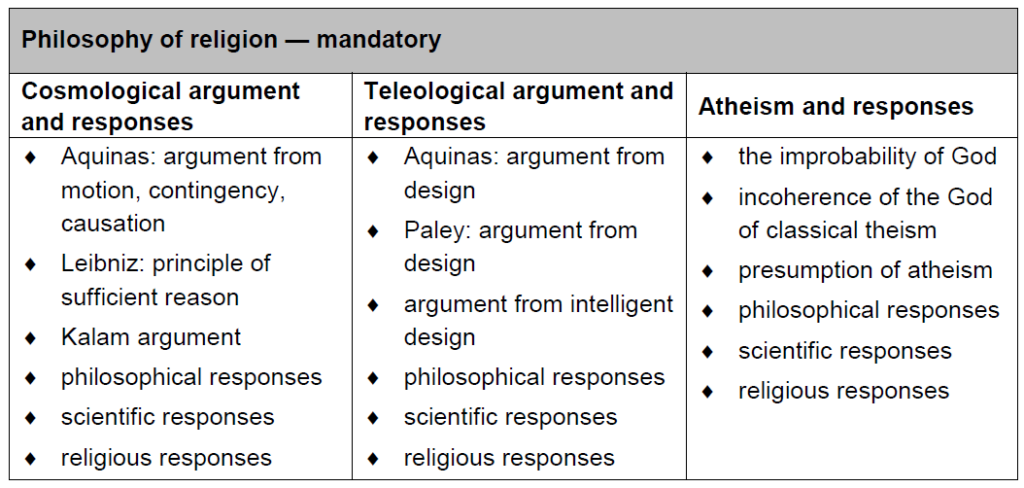Advanced Higher: Source Questions
In many ways, the source questions are an opportunity for candidates to boost their overall marks because the ‘describe’ answers should always be very straight forward, and will only ever include the language from the course specification:

That includes the language at the top of each column too. For example, you may be asked to ‘Describe the Teleological Argument’ or to ‘Describe Atheism.’ The same goes for the tables in the Religious Experience and Medical Ethics sections of the course (which ever you are studying).
Sources are typically 3-4 sentences long and the ‘describe’ question will indicate what section of the course the source relates to – which should also help with your analysis.
Here’s an example:
Intelligent design, as one sees it from a scientific point of view, seems to be quite real. This is a very special universe: it’s remarkable that it came out just this way. If the laws of physics weren’t just the way they are, we couldn’t be here at all. – Charles Townes
I found this source simply by googling ‘Quote to support intelligent design.’ I then checked that Charles Townes is a credible source (he has a PhD from Cambridge). To write your own questions, you can try this for the other content headings – including ‘quote to refute’ or ‘quote against the’.
Describe what is meant by intelligent design. (5)
These are the questions that can be ‘prepared’ in that they are at least predictable. You also do not need to include a huge amount of information to gain a mark so you can easily save time on these questions too. If you look at the SQA mark schemes, you will notice that a well constructed sentence – with relevant and accurate knowledge – will gain a mark.
Intelligent design is the view that certain features of the universe and living things are best explained by an intelligent cause rather than an undirected process like natural selection. (KU) It suggests that life is too complex to have arisen by chance and that some external designer must have played a role in its origin. (KU) Proponents such a Michael Behe argue that some biological structures show irreducible complexity—they could not function if any part were removed—implying they must have been designed as complete systems. (KU) Richard Swinburne also made the point that intelligent design appeals to the fine-tuning of the universe; the idea that physical constants (like gravity or the speed of light) are so precisely calibrated that life could not exist if they were even slightly different. (KU) It differs from creationism by not specifying the identity of the designer and by attempting to use scientific methods to support its claims. (KU)
Do not panic if you have not studied the work of Behe or Swinburne… they are not part of the prescribed content. The joy of this course is that there are so many different thinkers that can be included! I’ve just used them as an example of how you might wish to pull in knowledge to a question like this.
Analyse this source (5)
This question is rather dependent on candidates understanding what it really means to ‘analyse’ and I’ve found that candidates often either end up giving more knowledge and understanding, or response to the topic rather than the source itself!
Analysis is about explaining the consequences or implications of the ideas presented, or even making connections to other ideas. I like to try and pull out specific words or phrases that are particularly emotive or that give an indicate of the authors feelings:
The phrase “it’s remarkable that it came out just this way” implies the author feels a sense of wonder at the apparent precision in the universe’s structure. (A) The author also describes it as ‘a very special universe’ which could be taken to mean that it should be protected, or at least respected as something unusual. (A)The author interprets features of the universe – such as the laws of physics – to be evidence of intelligent design, and therefore a designer. So, it is likely that they believe in God. (A) The source frames the physical laws as uniquely suited to the emergence of life, implying that the probability of such a life-permitting universe existing by chance is extremely low. (A) This leads to the suggestion that an intelligent designer is a more plausible explanation, so it is likely the author would reject evolution as being an adequate explanation for the complexity in life. (A)
In my answer, I have put analytical language into italics to try and emphasis that there is not ‘right and wrong’ here as such… it’s the candidates job to draw out the meaning of the source and what it could tell us about the author.
Evaluate this source (5)
I hope that we are past the point that candidates believe that evaluation is identifying potential strengths and weaknesses. But I am well aware that may be wishful thinking, therefore my advice for this question is to start with either ‘I agree’ or ‘I disagree’ with the source because… then the aim is support your judgement with reasoning.
It does not matter if you fully agree or disagree… it also doesn’t matter what you actually believe. The key here is being able to back up an argument:
On the one hand, I agree with the source because it highlights the remarkable precision of the universe’s physical laws, which supports the idea that we should value the universe as it is ‘special.’ Global warming is a real problem and anything that means more people take it seriously the better. (E) Furthermore, it raises important questions about the origin of the laws of physics, which science has not yet fully explained – the idea of intelligent design offers a more complete explanation because it explains how and why it came to be. (E) However, overall I disagree with the source because it assumes that fine-tuning automatically points to an intelligent designer, without considering alternative explanations like the multiverse theory. (E) I also think that it also lacks scientific evidence, relying more on personal reflection than empirical data. The argument is not falsifiable, meaning it can’t be tested or disproven, which weakens its scientific credibility. (E)Also, just because something is improbable does not mean that it is impossible. It is true that laws of physics could have been different, and life would not have occurred but when there is a roll of dice they have to land one way, and sometimes it is in your favour. (E)
Again, there’s not really an answer you can ‘pre-learn’ here as the candidates do need to be careful respond to the source and not the topic. But that’s also a good thing because as long as you support your judgements then you can’t really go wrong.




